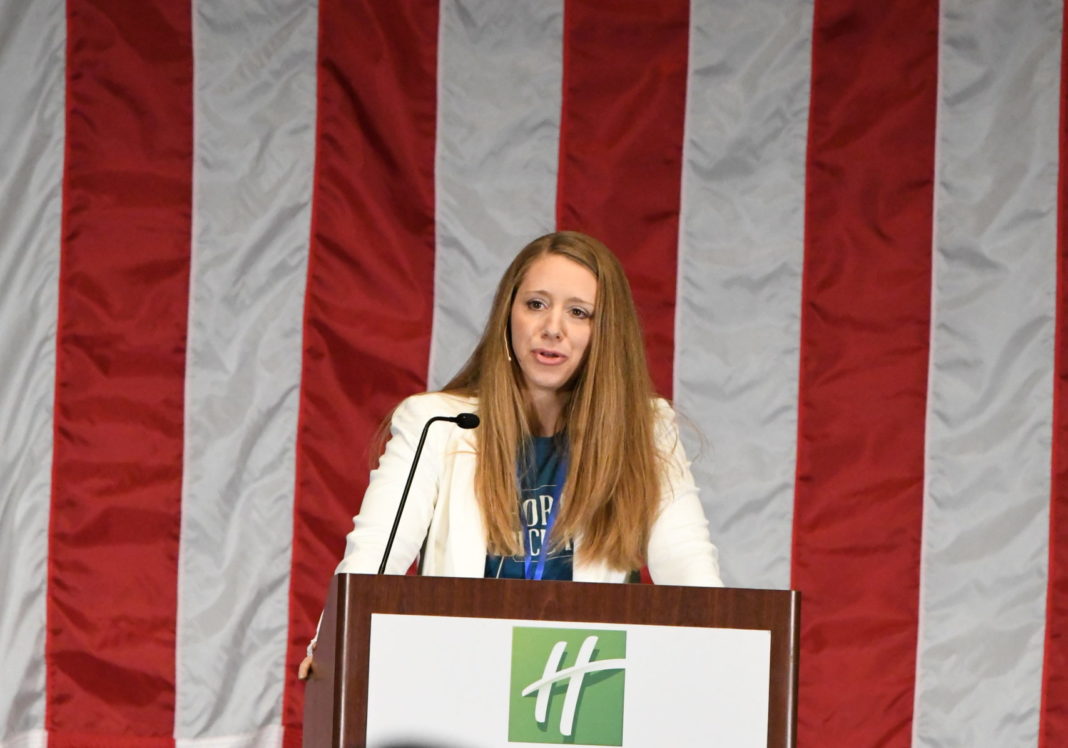***This is the third and final piece covering Lindsay Maher’s presentation at the Informed Conference 2020 hosted by Informed Choice Iowa on Saturday. The previous two stories can be found at the following links: story one, story two.***
The Vaccines and Related Biological Products Advisory Committee was found in a 2000 investigation that the overwhelming majority of voting members have substantial ties to the pharmaceutical industry.
“Conflict of interest rules employed by the FDA and the CDC have been weak, enforcement has been lax and committee members with substantial ties to pharmaceutical companies have been given waivers to participate in committee proceedings,” the report said.
Among the specific problems in the staff report:
*Three out of five FDA advisory committee members who voted to approve the rotavirus vaccine had financial ties to pharmaceutical companies developing different versions of the vaccine.
The FDA’s review budget is funded 75 percent from pharma, up from 27 percent in 1993.
Maher quoted Dr. Jerry Avorn from Harvard Medical School who said:
“Once you have that paying relationship, it creates a dynamic that’s not a healthy one.”
Dr. Michael Carome, a former HHS official said, instead of a regulator and a regulated industry, now we have a “partnership.”
Since 2008, novel drug approvals have doubled. Rejections fell in half.
“And some of that probably is a good thing,” Maher said. “Because there are a lot of drugs that are necessary for some of these chronic conditions. But how many of them are absolutely safe? We have no idea probably.”
Once a vaccine is on the CDC schedule, immunity for the manufacturer is in place. Another benefit for pharma is once on the schedule, they’re part of the National Childhood Vaccine Injury Act. The Vaccine for Children Program is a federally funded program that serves our underserved populations. In Iowa, 51 percent of kids are part of that program.
“So, you get your product on that schedule and you’re guaranteed payout,” Maher said. “You have a liability-free captive market of 74 million American children with guaranteed payment from the Vaccine for Children fund from the federal government and millions of more children are born every year.”
That same 2000 investigation by the House Reform Committee found the CDC grants blanket waivers to its members, allowing them to deliberate on any subject regardless of a conflict.
In 2009, the office of the inspector general investigated and found a systemic lack of oversight at the ethics program of the CDC. They found 97 percent of committee members had ommissions in disclosures of their conflicts of interest. Fifty-eight percent had at least one identified potential and 32 percent had one that remained unresolved. They continued to grant broad waivers to their members.
From 2002-2009, the director of the CDC was Dr. Julie Gerberding.
“She oversaw numerous vaccine studies which were later deemed not reliable according to the prestigious Institute of Medicine,” Maher said. “And in 2010, she became the president of Merck vaccine with a very lucrative salary. I wonder how much her job at the CDC and helping them out, helped her out.”
The CDC’s budget in 2018 was $11.5 billion. More than 40 percent of that — $4.9 billion — goes towards the promotion and purchase of vaccines.
“Now they’re also the marketing arm for the pharmaceutical companies, for the vaccine manufacturers,” Maher said. “They take on a lot of jobs for them, don’t they?”
The Immunization Safety Office only receives $20 million. Chronic health only gets $1 billion, despite 96 percent of deaths being caused by chronic illness, accident or suicide. And there is $1.4 billion for preparedness and response for epidemics.
The Institue of Medicine is periodically called upon to look at the science. In 2013, their report on the entire immunization schedule, the safety of it, was looking at a variety of conditions. They found no studies have compared the differences in health outcomes between entirely unimmunized populations and fully immunized children. Studies designed to examine the long-term effects of the cumulative number of vaccines or other aspects of the immunization schedule haven’t been conducted.
“That’s how we know,” Maher said. “They aren’t actually studying the whole schedule.”
In addition, the group periodically reviews if there is any causation from the adverse events being reported. In 1991, there were 22 adverse events reported. Twelve of them didn’t have any studies or research to say if it was or wasn’t caused by vaccination. In 1994, it grew to 38 out of 54 conditions. In 2011, it was 135 out of 155.
“Eighty-six percent of the adverse events and injuries reported into the system had zero research regarding vaccinations in general,” Maher said.
Dr. Heidi Larson, director of the Vaccine Confidence Project, told the WHO at the Global Vaccine Summit in 2019 that a lot of safety science is needed.
“Without the good science, we can’t have good communication. Although I am talking about all of these other contextual issues and communication issues it absolutely needs the science as the backbone. You can’t repurpose the same old science to make it sound better if you don’t have the science that’s relevant to the new problems. So we need more investment in safety science.”
Maher said they simply are not even performing safety science.
Going way back to the 1986 law, she asked if congressional leaders are ignoring the report they’re supposed to receive every two years.
“Well, again, Del’s team at ICAN did a FOIA request for all of the reports that were supposed to be going to Congress every two years,” Maher said. “They didn’t respond. He sued them and they received a stipulation. The order showed that NIH and HRSA had not acted on their duties and haven’t sent a single report in 32 years to Congress despite it being part of the federal law.
“Our regulatory agencies, they failed us. They wanted this job. The government wanted this job. This liability, this protection, this safety job. And they have failed us.”
Maher quoted Dr. Scott Atlas who said career government public health officials do not have a monopoly on knowledge.
“There are a lot of other great scientists out there doing research, speaking up,” she said. “But they aren’t being given the light of day because it doesn’t fit the agenda, it doesn’t fit the narrative.”
Nobody is perfect, Maher said, everyone has a lot to learn.
“But again, they chose this responsibility. They chose to take the liability,” she said. “So they absolutely must do everything in their power to actually abide by it or at the very least not do more harm.”
Families have not been compensated in a timely manner. The pharmaceutical industry has been maintained and helped to flourish into a $60 billion industry. They’ve created more products that are creating more problems.
“This, this right here alone is the reason we must maintain choice,” she said. “When our federal government fails to do its job to protect our citizens from harm, it falls on the states. It falls on us as a people to maintain the right to choice.”
Regardless of other aspects of the issue, Maher had a simple conclusion.
“Just the sheer fact that our independent safety monitoring is a complete sham should be enough that we get to have a choice,” she said.
Maher added that Americans are being discriminated against and kicked out of doctor’s offices for their choices. They’re being denied services by health care providers across the state because they make their own health care decisions for their own children.
“That is not right. And it shouldn’t be legal,” Maher said.
Most states had exemptions for children attending school. But recent crises have been used to remove liberties, she said.
“In 2014, there was a measles outbreak at Disneyland in California,” she said. “It was used to remove the religious and philosophical exemptions despite the fact that Disneyland is not a school, despite the fact that the majority of cases were in adults and despite the fact that 37 percent of the people who got measles were already vaccinated. But it got passed.”
In 2019, New York removed religious exemptions and added the HPV vaccine shortly later. Washington removed the philosophical exemption to the MMR vaccine. Maine removed philosophical and religious exemptions. Colorado fought off complete removal, but now instead of a religious or philosophical exemption, they’ve been combined into a non-medical exemption. Now parents have to go get an education for this exemption and a vaccine provider has to sign the exemption form.
“What do they know about my religious beliefs,” Maher said.
New Jersey fought off legislation to remove non-medical exemptions by having 10,000 people outside the Capitol yelling and screaming during debate.
California removed the medical exemption from the doctor-patient relationship. If an exemption is desired, you have to see the Department of Public Health and get them to sign onto it.
“What do they know about my child,” Maher said. “Some of them aren’t even medical doctors.”
Here in Iowa, Maher said we are “blessed” to maintain our religious and medical exemptions despite the “propaganda” that is out there. Claims like “no shots, no school.”
“A handful of schools might mention exemptions on registration paperwork in Iowa,” Maher said. “How is that not propaganda? How is that not lying by omission when you don’t tell people the law? Exemptions are there, they can be used for 1, 2, 5, all of the vaccines — it doesn’t matter. For most people it’s not all — it’s one or two. Exemptions don’t equal non-vaccinated despite what the public health department may say.”
In each of the last three years, a bill has been introduced by Rep. Mary Mascher to remove the religious exemption. There was also a bill to require homeschool students to meet the schedule.
“With both of those passing, children in Iowa would’ve had nothing n order to exempt themselves from the schedule,” Maher said. “Nothing. This is why we have to remain vigilant.”
There have also been misinterpretations of Iowa code by “unelected bureaucrats,” Maher said. This relates to foster care. New regulations are addressing whether you can have unvaccinated children in your house or whether or not you choose to vaccinate or not vaccinate when you foster children in your home.
Schools tried to exclude children this year during COVID because of a clause in the language that says during times of emergency or epidemic.
“We don’t have a vaccine for COVID yet, it’s not on the schedule,” Maher said. “But they misinterpreted it and took it into their own hands to try to deter us from sending our kids, to try to coerce us into following the schedule.”
Maher called on state legislators to protect their citizens.
“Our policies can protect our citizens,” she said. “Other times they say well, we’re just doing what other states are doing because they found success. If that’s our course of trajectory, the coasts are going to dictate our policy in the future. And we cannot let that happen.
“Silence in the face of evil is itself evil. God will not hold us guiltless. See, we the people, we’re the last hurdle for the pharmaceutical companies to get all the profit they want. For the public health departments to have complete control over us. We the people are the last hurdle. Which is why we must stay informed. We must unite together, we must educate others. We must work with our elected officials and support them. Because it’s going to take all of us — all hands on deck if we are going to have a fighting chance to maintain our right to choice.”











